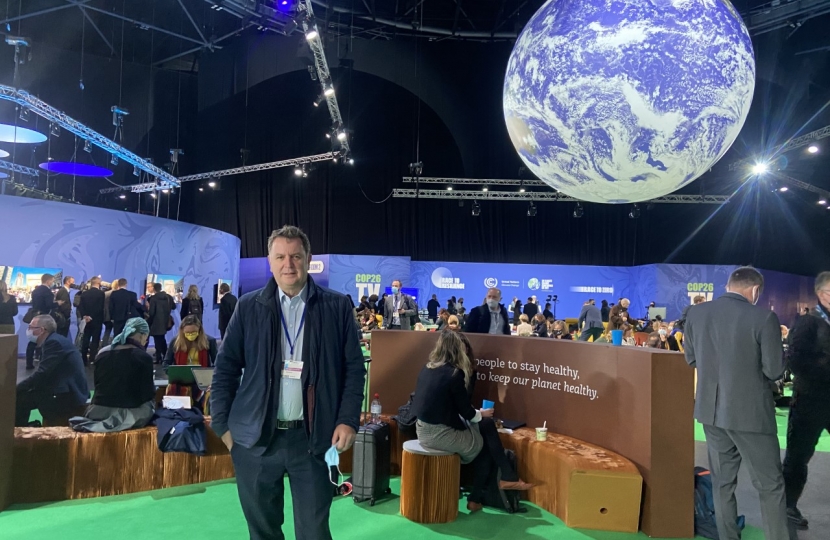
I have just returned from Glasgow where I attended the United Nations Climate Change Conference (COP26). At its launch, the Prime Minister warned that the world was at “one minute to midnight” and that action was needed now to avert catastrophic climate change. He urged other leaders to honour the goals of the Paris Agreement of 2015 and to go further in a number of key areas to keep a 1.5degree limit on temperature rises within reach.
The UK is already leading by example. A study by one of the world’s top universities – Yale in the United States – recently measured nations across 32 performance indicators (from climate change mitigation to air quality) to rank the world’s most environmentally-friendly economies. The UK was ranked 4th of 180 countries overall and 2nd only to Denmark for tackling climate change. Our CO2 emissions have fallen by 29% over the last decade and I was proud to play a part in this by steering a major Energy Bill through the House of Commons in 2013 which has helped shift us towards cleaner energy sources. In the 8 years since then, the proportion of our electricity generated from coal has fallen from 40% to just over 1% while the amount generated from renewable sources has increased from 8% to 43%.
So far the progress at COP26 includes:
- Coal: At least 23 countries have made new commitments to phase out coal power, including five of the world’s top 20 coal power-using countries.
- Deforestation: 120 countries covering more than 90% of the world’s forests have committed to halting and reversing forest loss and land degradation by 2030. It is backed by the largest ever commitment of public funds to achieve this.
- Methane: 100 countries have pledged to reduce methane emissions by 30% by 2030. The pact includes the US but not China, India or Russia (yet).
- India and Saudi Arabia: there have been important commitments by countries that have been among the more resistant to net zero targets. India unexpectedly announced a target of 2070 and Saudi Arabia 2060. While they are not as soon as we would like, it marks a very positive shift in policy.
- Green Tech: 40 countries have joined the Breakthrough Agenda, a 10-year plan to work together to create green jobs and growth globally, making clean technologies and solutions more affordable and accessible.
- Green Finance: Led by former Bank of England Governor Mark Carney, the biggest financial companies in the world have committed to providing $130trillion of private capital to help reach net zero targets by 2050. The importance of this cannot be overstated – financing is key to helping economies transition to net zero.
My main focus around COP26 has been on these last two issues – working with other countries on how we can make economic growth more compatible with our net zero mission. The House of Commons Treasury Select Committee, which I chair, has done a lot of work on this and a major report we published can be found at www.melstridemp.com/netzero.

